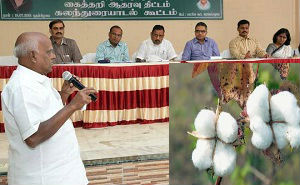
The government is trying to control the price of cotton
YarnsandFibers News Bureau 2018-07-25 12:02:00 – MaduraiPrincipal Secretary, Handlooms, Handicrafts, Textiles and Khadi Department, K. Phanindra Reddy, Co-optex Managing Director T.N. Venkatesh, Director of Handlooms C. Muniyanathan, Additional Director K. Kannan, and Director of Sericulture P. Sri Venkada Priya spoke. They talked about various issues like new technology, design development, product diversification, brand promotion, market expansion, working capital assistance and research and development. Collector K. Veera Raghava Rao was present.
Weavers from Madurai, Dindigul, Aruppukottai, Ramanathapuram, Nagercoil and Tirunelveli, representing their association and societies, expressed their grievances regarding the high Goods and Service Tax levied on their products as well as on their production materials. Some spoke about unequal allocation of houses under solar-powered Green House Scheme and the need to increase wage.
The minister assured the weavers that the government would soon announce an increase in wages. “But the government cannot raise them significantly as it would increase cost of the product and customers would be hit,†he said.
Mr. Manian said that weavers could build houses under a new scheme launched by the Central and State governments - House for All. A total of ₹ 2,10,000 would be provided to the beneficiaries.
He said the public oppose establishment of common effluent treatment plants (CETP) near dyeing units. Efforts to make eco-friendly textile was under way in Tirupur. It would be replicated soon. A sum of ₹175 crore had been provided as rebate subsidy and ₹200 crore in the form of interest-free loans to weavers.
Minister for Handlooms and Textiles, O.S.Manian, said that, “The price of cotton has significantly shot up from ₹ 24,000 to ₹ 51,000 per bale as the climatic conditions have been erratic with extensive rain and sunshine causing heavy loss to farmers and weavers. The government is trying to control the price and it is in discussion with the Centre.â€
Addressing a group of weavers from south Tamil Nadu, he said that sale of cotton for export would be reduced and sale within India would rise.
A senior official from the Handloom Department said that only five % of the total cotton production takes place in Tamil Nadu. The government depends on Karnataka, Telangana, Andhra Pradesh and Maharashtra to cater to the needs of six spinning mills in the State.
A weekly meeting is held to establish full requirement of cotton. They would take steps to improve it, as production has been hit.
Market Intelligence
Ask for free sample Report

experience
Customer Base
dedicated team
Countries Served Worldwide









